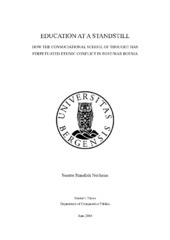Education at a standstill: how the consociational school of thought has perpetuated ethnic conflict in post-war Bosnia
Master thesis
Permanent lenke
https://hdl.handle.net/1956/12334Utgivelsesdato
2016-06-01Metadata
Vis full innførselSamlinger
Sammendrag
This study set out to explore why the consociational prescription to have cultural autonomy in education contributes to perpetuating ethnic conflict instead of conflict resolving, in post-war societies like Bosnia and Herzegovina. The prescription is to recognise and strengthen the major ethnic groups through decentralisation of decision-making in education. The study analyses a fragmented and politicised educational system, and its consequences for inter-ethnic relations, which are analysed and presented as manifestations of exclusivist, educational protectionism. The single-case study on consociational post-war Bosnia and Herzegovina builds on interview data from a three-week-long fieldwork in Mostar and Sarajevo, in January 2016. It uses a constructivist perspective to analyse conflict and to understand how ethnic boundaries are being constructed. It is genuinely inter-disciplinary, drawing on work from social anthropology and comparative education, while remaining firmly rooted in the discipline of comparative politics. It concludes that the cultural autonomy prescription assumes a recognition of equality between the major ethnic groups, that it requires such a recognition to contribute to conflict resolving, but that it is unable to produce such a recognition. Decentralisation in education serves to empower the majority ethnic group in the various administrative units, at the cost of ethnic minorities. Without a recognition of equality, the Bosnian case shows, the consociational approach to cultural autonomy in education is fundamentally incapable of handling diversity. Consociationalism correctly values the importance of education, but an emphasis on recognition and strengthening of ethnic groups also have inter-group effects, which must also be tackled. The failure to theorise the negative face of education in ethnic conflict' is attributed to an instance of conceptual stretching, and a failure to consider a mainstream constructivist perspective on the construction and maintenance of ethnic boundaries. Measures to increase internal cohesion also increase external differentiation. Educational protectionism in Bosnia is associated with particularistic claims for group rights, and is manifested in ethnically slated, mono-perspective curricula and various forms of segregation in schooling, most visibly in the two schools under one roof", where the students are separated on the basis of their ethnicity.
